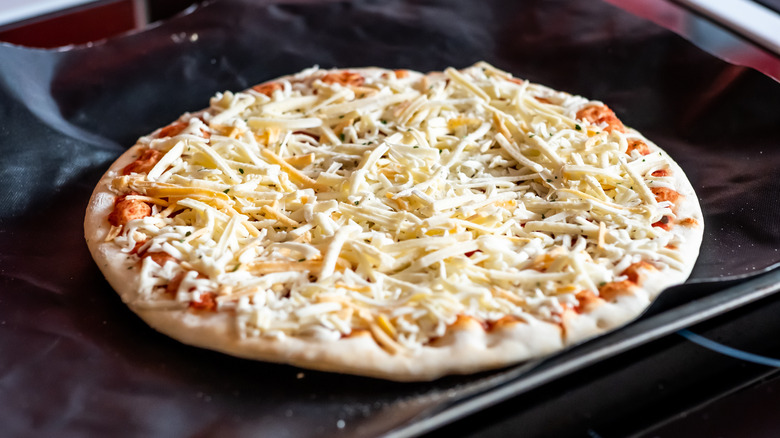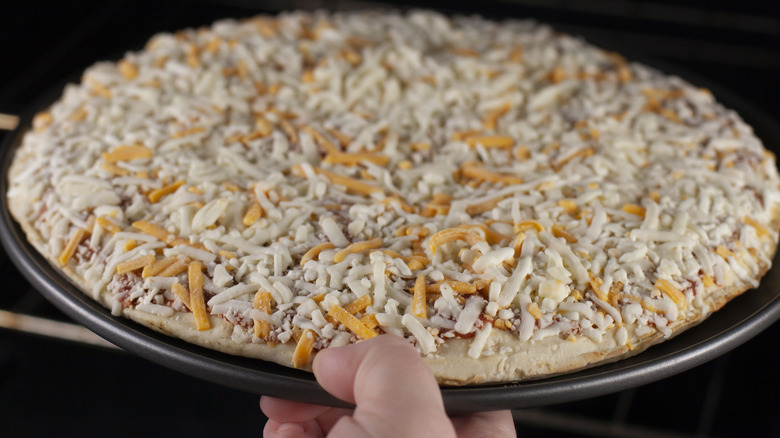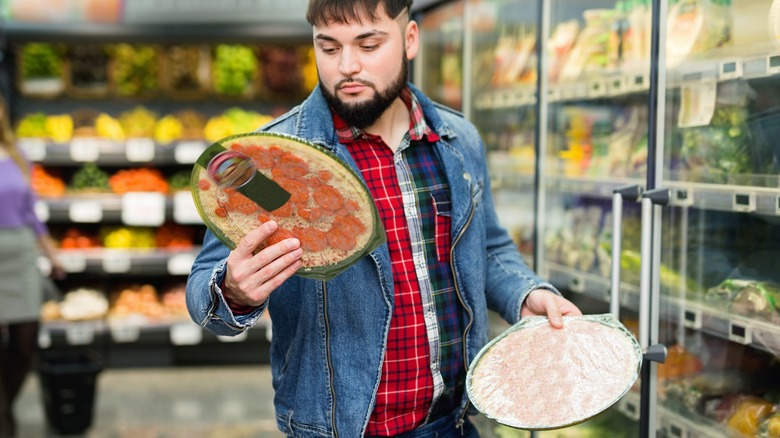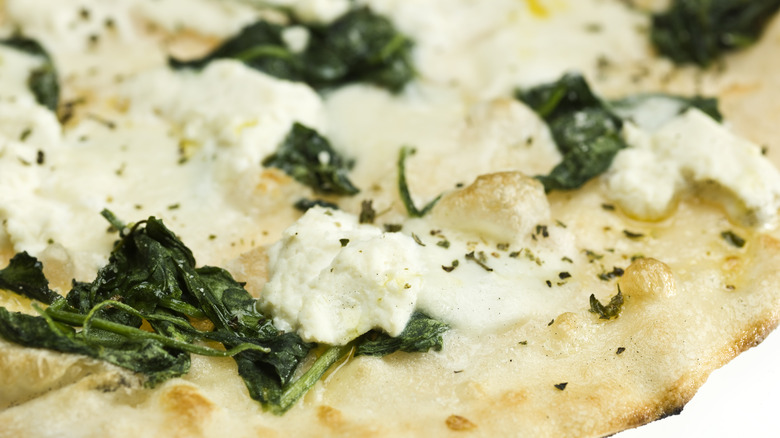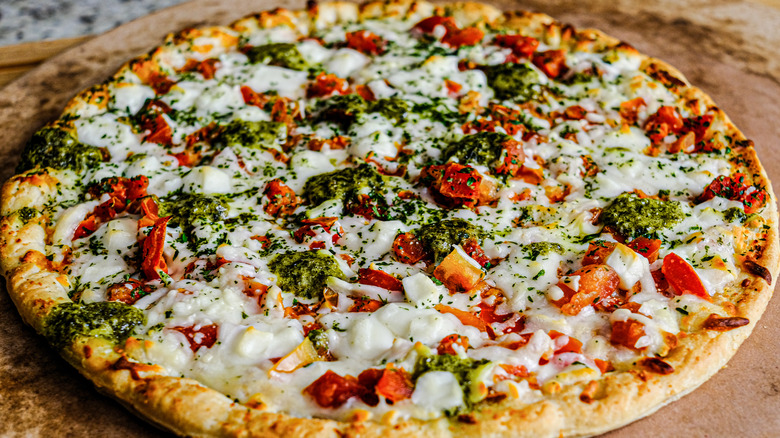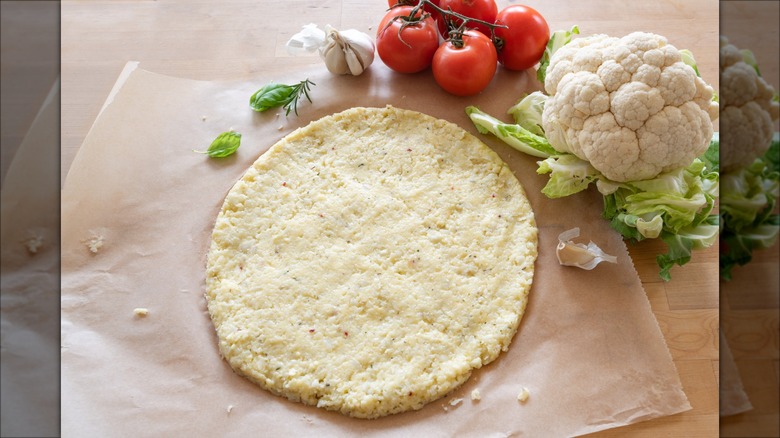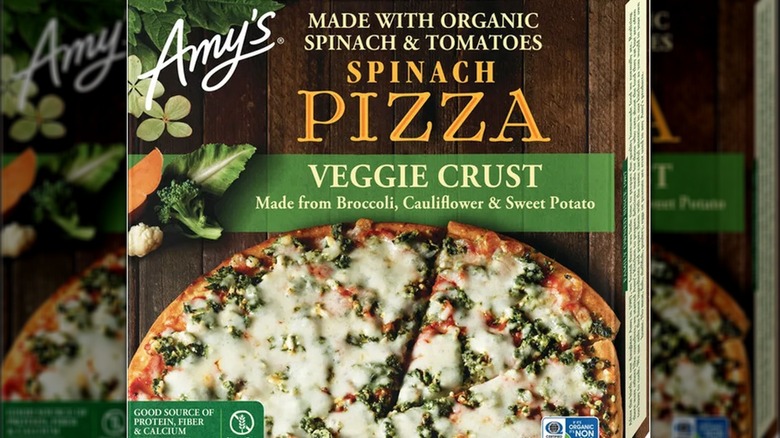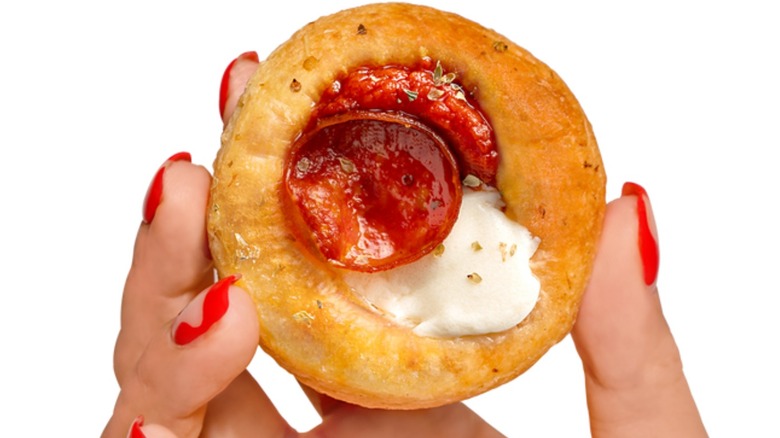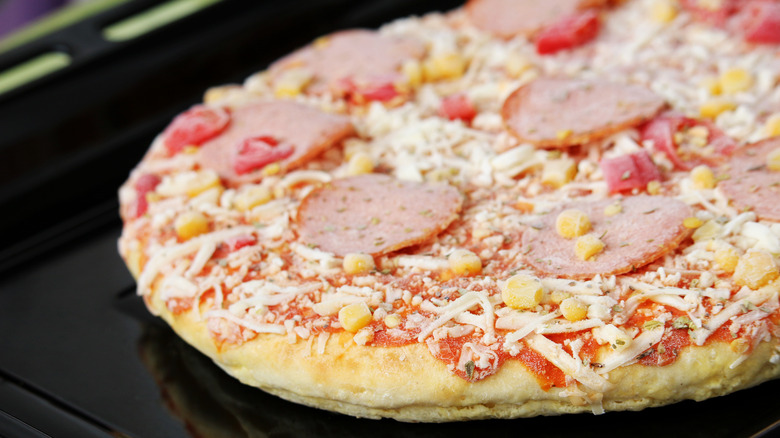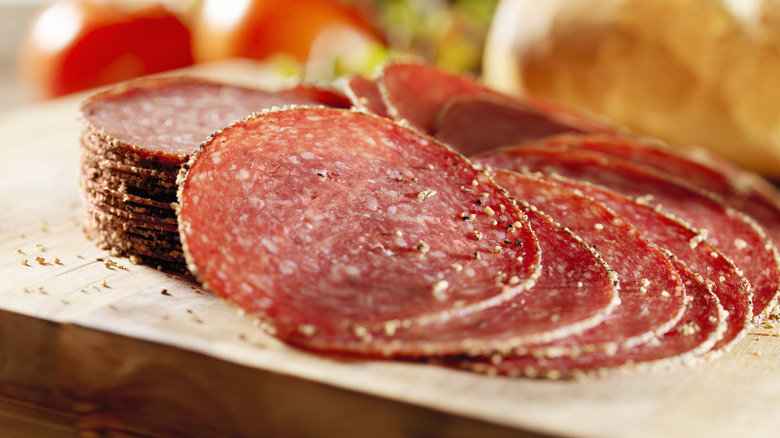False Facts About Frozen Pizza You Thought Were True
Frozen pizza is one of those foods you either love or hate. This classic commodity has garnered popularity over the years, mostly for being a cheap and convenient option for busy people who'd rather not be spending hours cooking in the kitchen. Still, frozen pizza carries with it certain connotations, some of which are true and others that are far from it. In this article, we've set out to reveal which beliefs about frozen pizza actually hold weight and which are purely myths. We're scanning ingredients, price points, health claims, and more to bring you accurate and informative details concerning what you can expect from the modern-day frozen pizza market.
Ready to learn more about this cheesy classic? If so, good. We're ready to put to the test some of the most commonly held beliefs about frozen pizza in order to reveal the truth of the matter, and we're sure you'll walk away knowing a little more than you'd ever thought you could about this commonly eaten casual fare. Let's dig in.
Frozen pizza is always cheaper than fresh
When you think of frozen pizza, you probably think it's cheap, right? And while the price of frozen pizza is sometimes lower than some pizza parlors, there are still freshly made pizzas out there that could cost you just as little, if not less, than your average frozen pizza. Of course, there are other details to consider when doing a direct comparison of frozen pizza to fresh-baked pizza, including how many toppings you get, pizza size, and quality. Still, deals like Little Caesar's $5-6 Hot-N-Ready pizzas make for comparable frozen pizza substitutes, especially when you consider that many frozen pizzas lining the shelves cost $5 and up already.
Still not impressed? We ran across Screamin' Sicilian pizza brand, a popular in-store grab, and found it selling for about $10 a pop at our local market at the time of publication. If you can catch a special (or get your hands on a good coupon), you could easily score a large pizza at this price already baked and ready to eat, depending on where you dine. Hey, we aren't here to talk you out of your favorite frozen pizza grab, but we want you to know that if you think frozen pizza is always the cheapest way to go, there are a few pizza establishments out there that may rival your favorite frozen pizza's cost.
It's more convenient
Yes, frozen pizza is convenient. But is it necessarily more convenient than delivery? That depends. Frozen pizza takes the hassle out of having to hop in your car and pick up a pizza. It also cuts down on time because it cuts out the wait for delivery. We get it. But the truth is that if you're already out and about and get a craving for pizza, going home to bake it up isn't the most convenient option. Having someone cook up a freshly baked pie is quicker, takes less work, and ultimately, may even be more flavorful.
As we said earlier, we're not going to pretend that frozen pizza has no perks in the area of convenience because it certainly does. We just think that it's the context that matters most here; depending on where you are and what you are doing, choosing to visit your local pizza parlor in person just might be the better, more convenient way to go.
Frozen pizza must be enjoyed as is
Adding more toppings to frozen pizza may seem weird, but honestly, it's a great way to upgrade a pie exactly how you like it. Sure, you could buy a pizza already loaded with toppings, but how certain are you that the pizza you're seeing on the package will actually represent what you'll get? If you have some of these toppings already stashed in your fridge, you could consider adding them to a high-quality cheese pizza, and end up with a better-tasting pizza because of it.
Love extra cheese? Add more mozzarella shreds before popping your pizza in the oven. Want to use the high-quality, uncured spicy pepperoni you love? Buy a cheese pizza and load 'em on. Even a few shreds of deli ham can add interesting flavor to your pizza. Virtually anything you have on hand can be used as an upgrade; the world is your oyster on this one. Do it up as you see fit!
All frozen pizza brands are the same
Most people probably think of Red Baron or Tombstone brands when it comes to frozen pizza, but in case you haven't sampled a store-bought slice in a while, know that there are plenty of brands out there that offer a variety of yummy pizzas to choose from. And some of these varieties, we're happy to report, feature better-tasting and potentially higher-quality pizzas than others.
Some of the more interesting, out-of-the-norm brands we've noticed on store shelves include options like California Pizza Kitchen, Donatos (sometimes found in your grocer's deli section), and even Kroger's own Private Selection pizza variety. If you choose to go the Private Selection route, know that it often features several interesting topping creations outside of your normal pepperoni and sausage varieties (French Goat Cheese and Marinated Vegetables pizza, anyone?)
Have certain things you can and can't eat? We're confident there's a pizza out there for you. Many frozen pizza manufacturers have gone to great lengths to ensure that even those with dietary restrictions can get the most out of every bite. Give your local supermarket cooler section a visit and see what you discover!
There aren't any healthy options
Though we'll admit that purchasing a frozen pizza probably isn't the healthiest route to go when planning for dinner, there are some options out there that are healthier than others. These days, you can find a plethora of pizza types to choose from, many of which offer their own health benefits that may be able to counteract some of those healthy presumptions often tied to frozen pizza eats.
So, what should you look for in a presumably "healthy" pizza? Some dietitians recommend you go for high-protein, high-fiber, and low-sodium brands. This could be tricky to find, we know, but you may be surprised at what you may unearth if you look hard enough. Banza pizza, for example, is a great high-protein option that is lower in carbs. It's also packed with fiber and touted as gluten-free. Want a crust that offers whole wheat? Try Amy's Kitchen pizzas if you can find the brand near you. This frozen pizza brand often comes with yummy veggie toppings, organic unbleached flour, and sometimes an infused crust chock full of goodies like broccoli, sweet potato, and cauliflower. We realize these aren't all traditional picks, and no, not everyone will dig them. Still, if you're looking to go the healthy route, you still have plenty of options.
Frozen pizza can't be enjoyed by those who have dietary restrictions
We've talked about some of the healthier frozen pizza options out there, but what about those of you who have specific dietary restrictions? From lactose intolerance to the need for low-carb options, there are frozen pizzas out there that can suit many dietary preferences.
Can't or won't tolerate cheese? Frozen pizza would seemingly be out of the question for you. Shockingly, however, there are several frozen pizzas on the market that don't use cheese; not real cheese, anyway. Daiya is a great example of a brand that dishes up frozen pizza that's perfect for those following the vegan lifestyle or suffering from milk sensitivities. This pizza often offers up hearty veggie toppings while using a faux cheese mixture to serve as a replacement for the real thing. Will it taste exactly like regular pizza? Probably not. But many people seem to enjoy this brand, along with several others.
Also, if you're in need of a low-carb option, check out Life Cuisine Frozen CarbWise Keto Veggie Pizza. This individual-sized pizza comes at only 7 net carbs per box, and fans claim it's one of the best-tasting keto pizzas out there. There are also other brands taking a stab at keto frozen pizza varieties, so if carbohydrates remain a major health concern for you, be sure to keep your eyes peeled; you may be surprised to find a pizza out there that just might suit your needs.
Frozen pizza can't be homemade
Most people associate frozen pizza with grocery stores, but did you know you can easily make several frozen pizzas at home? Doing it this way can save money and often tastes better to boot. So, how's it done? To be honest, the process isn't exactly a short one. You will need to whip out the ingredients to make your own crust, your own sauce, and have your own toppings on hand. Thankfully, the crust and sauce part isn't hard at all, though the dough will need time to proof before you can add toppings and freeze it. Just remember that though the homemade pizza process can be long in the beginning, what you'll be left with is a fresh pizza made from fresh dough the next time your pizza cravings come calling.
Does the process of making a homemade frozen pizza have to take this long? No, not at all. To make the task easier, try purchasing a premade pizza crust and adding your own cheese and toppings to it. As for the sauce, opt for a store-bought pizza sauce or use a jar of high-quality marinara sauce. Build your pizza, wrap it in cling wrap, throw it in the freezer, and voilà. You've got a homemade frozen pizza on hand for any time hunger strikes. Hooray!
Cauliflower crust frozen pizzas are always healthier
We don't know about you, but before we knew better, we thought frozen cauliflower pizza crusts consisted of one thing: cauliflower. Silly us! After flipping over boxes and examining ingredients, we eventually came to realize that frozen cauliflower pizzas contain a little more than just veggies; they also contain starches and sometimes wheat. At this point, some of you may be wondering why the addition of starch and wheat would be a bad thing when it comes to a cauliflower crust. But those who follow the keto diet or are looking for gluten-free frozen pizza varieties know what frustration flours and starches cause. Aside from the wheat causing an issue for the gluten-sensitive, starches, rice flours, wheat flours, and the rest equate to higher carb counts for those looking for low-carb options. And because cauliflower is known to be a popular keto-friendly food, it sometimes can feel like trickery to know that frozen cauliflower crusts aren't exactly what you think.
Now, of course, if you don't have dietary concerns, adding cauliflower to a crust does seem to provide benefits. After all, who would argue with a veggie stuffed crust for your health? Just remember though these pizzas may be crammed with veggies, they also continue to sport the same high fat and high sodium content as other frozen pizzas out there. Thus, we simply do not view cauliflower crust frozen pizzas as better than the real thing.
All frozen pizza options are packed with sodium
Sodium is one of those issues you seemingly can't avoid when it comes to frozen pizza. Sure, you can nix the cheese, the wheat, and even the meat, and somehow, still wind up with a day's worth (or more) of sodium in a single pizza. Sigh.
Despite this fact, there are a few pizzas out there that offer surprisingly low sodium options, especially when compared to other frozen pizza types. For example, Lean Cuisine's Protein Kick Spinach and Mushroom Pizza registers at only 340 mg per pizza, while Amy's Spinach Veggie Crust Pizza runs about 470 mg of sodium per ⅓ pizza. We'll admit that these sodium values are still quite high, but they're nothing compared to the sodium content in other pizza types. Even Kroger's Simple Truth brand's seemingly "healthy" cauliflower pizza packs as much as 1060 mg of sodium for only ¼ of the whole pizza. Catching our drift now? Though you'll be hard-pressed to find a frozen pizza very low in sodium, there are some brands out there that are better than others. Take your time, study the ingredients, and find out which pizza brand might be the best pick for you.
All frozen pizzas come in the same form
When you think of frozen pizza, you probably automatically think of a circular disc with cheese and toppings thrown across the top. The thing is, though this is the classic way most of us view pizza, it isn't your only option when shopping for this Italian delight at your local supermarket. These days frozen pizza takes on a variety of forms, with the most interesting we've come across being The Pizza Cupcake. Coming in miniature form, these pizza cups resemble something similar to a cupcake, but with melty cheese, spicy pepperoni, and robust tomato sauce making up its contents.
Of course, you probably already know about your Hot Pocket, "pizza roll," and bagel bite pizza varieties, so we won't bore you with the details on each. We're simply here to remind you of the options available to you, so you don't think you have to make the same basic selection every time you get the itch for pizza.
Frozen pizzas tend to contain only a smattering of cheese
Ever pop open a box of frozen pizza and find what you see disparaging? Yeah, we totally get it. It's beyond disappointing to get a frozen pizza home only to find out there are only three shreds of cheese on the pie. Of course, we're being sarcastic here, but some frozen pizza varieties come with such little cheese it can sometimes make you wonder if buying a frozen pie is even worth your time.
Thankfully, there are frozen pizza brands out there that know how to get the job done right. For us cheese lovers, having the right amount of cheese on pizza is serious business; frozen pizzas never get a pass. And while we agree that it's easy enough to add your own mozzarella to a lacking pie, we also believe frozen pizzas should already come correct in the cheese department; it's what we're spending our hard-earned money for, right?
So, which brands can you count on to do it correctly? Try the five-cheese Stuffed Crust Digiorno Cheese Pizza or the Home Run Inn Cheese Classic Pizza. Both of these pizzas come practically drenched in cheese, and once heated up, provide gooey, satiating, mouthwatering cheesiness for all of us cheese lovers to behold. Yum!
All frozen meat pizzas contain traditionally cured meats
Pepperoni and other cured meats often carry a negative connotation with them, usually due to their nitrate content. While most of these toppings will come on pizza in their traditionally cured form, you should know that there are options out there for cured meat toppings that don't necessarily involve classic curing methods.
Often referred to as "uncured" pepperoni on frozen pizza packages, these seemingly normal pepperoni are still cured, just by a different process. Manufacturers often take to curing uncured or "natural" pepperoni using celery juice powder or a similar ingredient. Vegetables like celery are naturally high in nitrates, and thus serve the same purpose as traditional nitrites do. These claims would lead you to believe that these pepperoni don't have any nitrites at all, the truth is that they likely do, just in a different form.
So, is this good or bad? Depends on what you value and how you view it. For those wishing to avoid any meat containing nitrates, the best thing to do is to grab a cheesy slice without meat to be safe. If you want to go the more natural route but still want pepperoni on your pie, go ahead and pick the "uncured" option. Just know that research has not yet found naturally cured meats to be any different from traditionally cured meats, so whether or not you are actually doing your body any better is yet to be discovered.
